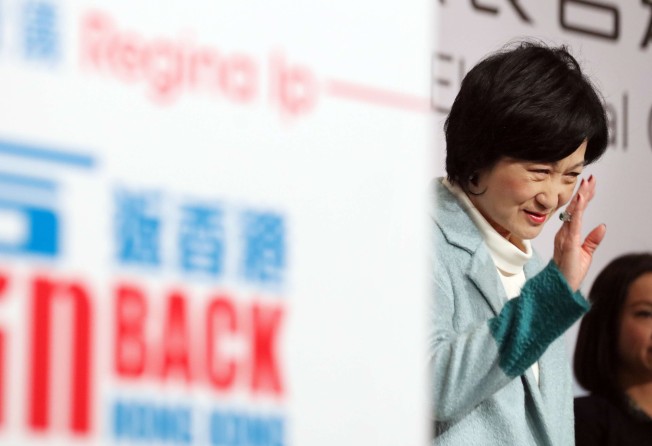Regina Ip revives divisive issues, including Article 23, as she enters Hong Kong chief executive race
Ex-minister vows to resurrect political reform and national security legislation as well as taking on city’s housing, social and economic problems

Lawmaker and former minister Regina Ip Lau Suk-yee on Thursday announced her intention to revive two of Hong Kong’s most contentious political issues – democratic reform and national security legislation – as she launched her campaign for the city’s top job with plans to tackle housing, social and economic problems.
Her manifesto sporting the slogan “Win Back Hong Kong” fired a broadside at potential election rival Financial Secretary John Tsang Chun-wah, accusing the government of being “over-conservative in public finance, and falling short of being a leader in economic development”.
Watch: Regina Ip announces chief executive bid
Ip unveiled her strategy to become the city’s chief executive at the Convention and Exhibition Centre in Wan Chai, flanked by more than 20 supporters on stage, including professionals and her party’s legislative and district councillors.
The former security minister projected herself as well positioned to improve ties between Hong Kong and the mainland, bridge the gap between the city’s executive and legislative branches, and bring the administration closer to the people.
“Over the past few years, [there has been] unprecedented division and hostility among Hong Kong’s society ... I feel my call is to stand forward and walk the extra mile for Hong Kong, leading Hong Kong to the better future that it deserves,” she said.
My call is to stand forward and walk the extra mile for Hong Kong
Ip’s election platform covered nine major areas, but it was the last one that caught the most attention on Thursday – relaunching the political reform process to enable the election of the city’s leader by universal suffrage within the rigid framework set by Beijing – as well as the shelved national security legislation that once forced her to quit the government and leave Hong Kong.
Ip said she would carry out “suitable measures”, if elected, to implement Article 23 of the Basic Law and fulfil the Hong Kong government’s constitutional duty to have laws in place against offences such as treason and sedition.
In 2003, as security minister, Ip had been in charge of pushing the bill through the Legislative Council, but her combative and high-handed approach made her the most unpopular government official at the time.
She stepped down after 500,000 people took to the streets in protest and forced the government to shelve the bill.
“I feel ashamed for my handling of the legislation,” she said yesterday, seeking to reassure the public there would be nothing to worry about.
Ip promised to relaunch public consultation on constitutional reform based on the framework laid down by the National People’s Congress Standing Committee in 2014, which was voted down as “fake universal suffrage” by pan-democratic lawmakers.
After winning more than a quarter of the seats on the 1,194-member Election Committee that will pick the next chief executive, the pan-democrats have said they will only back a candidate who rejects Beijing’s framework.
But Ip insisted that plan “represents a sincere attempt to resolve the deadlock in Hong Kong” and should not be scrapped.
A candidate needs 150 nominations from the committee to be eligible, and at least 601 to win the leadership race next March.
On public finance, Ip proposed that the future administration must move “towards utilising government revenue to stimulate the economy, narrow the wealth gap and support the minorities”.
She laid out plans to ramp up public housing and land supply, and tackle issues ranging from education to retirement protection and air pollution.
Among those who attended her campaign launch, Paul Tse Wai-chun was the only lawmaker from outside her party to show up.
Entertainment mogul Allan Zeman was there as a special adviser to Ip’s campaign office.
Noting the shortage of big names at the gathering, Chinese University political scientist
Ivan Choy Chi-keung said it might deprive her of Beijing’s backing.
“With so many pan-democrats in the [1,194-member] Election Committee, Beijing would not have high hopes of Ip being able to get 601 votes,” Choy said.
Ip yesterday also met Chief Executive Leung Chun-ying, who will not be seeking re-election, to tender her resignation from the Executive Council.
Leung expressed thanks for her “valuable contribution to policy-making”.
Ip’s policy highlights
1. Housing and land supply: speed up the construction of public rental and subsidised flats.
2. Economy: formulate new industrial policies to expand the economic structure and facilitate the development of agriculture and fisheries.
4. Government structure and civil service: establish a land, planning
and housing bureau to streamline the handling of land supply and housing.
5. Retirement protection: establish a “three-tiered subsidy for elderly care”, ranging from HK$1,470 to HK$4,409 per month for those above 65. Abolish the Mandatory Provident Fund’s offsetting mechanism.
6. Education: ensure the next education minister is a capable and able person, dedicated to bringing the system back on track. Reduce students’ stress by improving the Territory-wide System Assessment.
7. Environmental protection: improve air quality and provide a more liveable environment by expanding the area designated as a low-emission zone in Central and Causeway Bay.
8. Cultural development: provide more exhibition sites to local artists and sculptors while supporting artistic workers with special needs, such as establishing art studios by utilising vacant land.
9. Sports development: provide additional resources to incubate talent in sports sciences, medical sciences and physiotherapy to enhance the quality of athlete training.